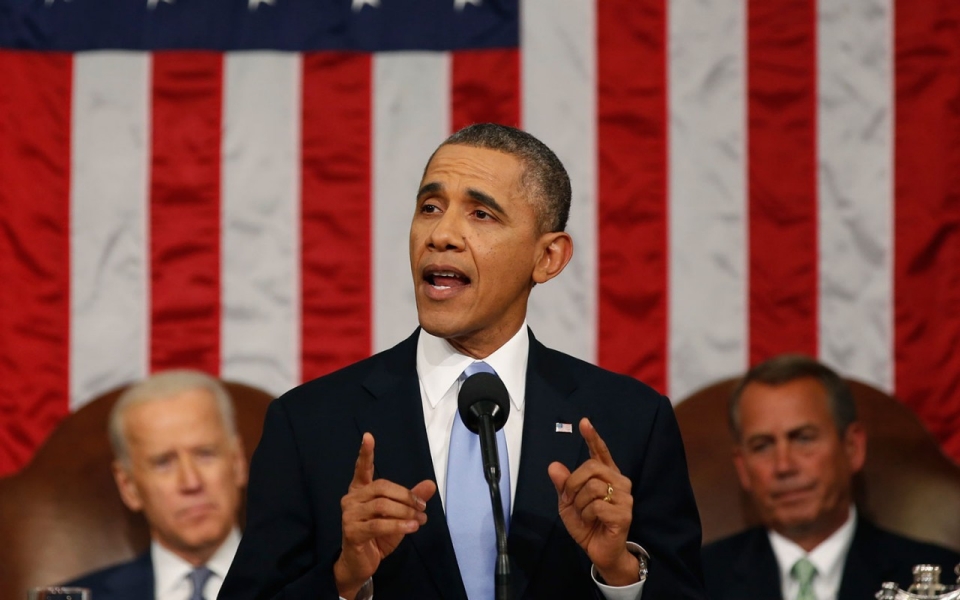
During President Barack Obama’s 2014 State of the Union address on Tuesday night, one section stood out. “After four years of economic growth,” said the president, “corporate profits and stock prices have rarely been higher, and those at the top have never done better. But average wages have barely budged. Inequality has deepened. Upward mobility has stalled.” But Obama left unstated the most important point of all: Under his watch and thanks to his policies, those at the bottom of the ladder face fewer and fewer opportunities to get ahead. Worse still, most of the policies he proposed during his address would make social and economic mobility even harder.
I just returned from a three-day trip to Austin, Texas. Spend a few days in Austin and you feel as though you are in a different America from the one described by the president. In the next two years, downtown Austin’s hotel capacity will increase by 57 percent. In the last 20 years, Austin’s population has increased by an astounding 71 percent. The state of Texas hosts four of the 11 largest cities in the country: Houston (4), Dallas-Fort Worth (5), San Antonio (8) and Austin (11). The biggest problem in Austin is not the economy or unemployment — it is the traffic.
Texas is booming and drawing opportunity seekers from all over North America who want a better life. According to the Missouri Economic Research and Information Center, Texas ranked 10th nationwide in a measure of states with the lowest costs of living. That is because the state has a predictable and relatively light regulatory regime that drives down the cost of doing business, and thereby the cost of consumer goods and services.
Add to that the fact that Texas has no state income tax. Immigrants to the state know that every dollar they make goes much further in the Lone Star State than it would in places such as California, New York or D.C. For four straight years, Texas has led the nation in job growth. From 2001 to 2011, it added 732,800 jobs to its economy. No other state topped 100,000.
The president likes to think of himself as an empiricist, a nonideological believer in what works. So why is it that his policy approach is the opposite of the one that has worked in Texas and elsewhere?
Obama noted in his address that “stock prices have rarely been higher,” benefiting wealthy investors, big banks and corporations. That is because the Federal Reserve, through a monetary policy committed to ultra-low interest rates, has recklessly and artificially inflated the value of equities, bonds and real estate. This has been great for the wealthy, but it has done nothing for the poor or the unemployed. The president strongly endorses the Fed’s approach, doubling down on it by appointing one of its leading exponents, Janet Yellen, as its new chairman.
The president wants to increase the minimum wage to $10.10 an hour. That is great for the children of wealthy parents in the suburbs who want to earn extra money in their spare time. But it is not good for those trying to work for small businesses in inner cities, where the difference between employing 12 people at $7 an hour and 10 people at $10 an hour is two lost jobs.
The president wants to further extend temporary unemployment benefits that were supposed to expire years ago. And yet the latest findings (PDF) from researchers at the University of Pennsylvania indicate that ending unemployment benefits correlates to a significant drop in unemployment.
The president has dramatically expanded the power of the Environmental Protection Agency to hassle businesses and drive up their costs. In his address Tuesday night, he sought to do more of the same. A certain amount of environmental regulation is appropriate. But money that businesses spend on satisfying needless bureaucratic demands is money they do not spend on hiring new workers.
Finally, there is Obamacare. It is a worthwhile goal to ensure that everyone in the U.S. has health coverage. But the president’s health care law does so in a clumsy and costly way. For example, by forcing businesses with more than 50 employees to offer costly, government-certified health coverage to their full-time workers, the Affordable Care Act ensures that many such businesses will hire only part-time employees, or stop expanding altogether.
The president spent much of his first term blaming George W. Bush for all of his problems. He no longer has that excuse. Obama has asked us to judge him on whether or not inequality has narrowed, and upward mobility improved, on his watch. As he enters his sixth year in office, they have not.
The views expressed in this article are the author's own and do not necessarily reflect Al Jazeera America's editorial policy.






Error
Sorry, your comment was not saved due to a technical problem. Please try again later or using a different browser.